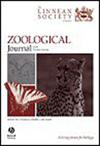Species level hidden diversity within morphospecies: Anatolia-based evolution and cryptic species diversity in the Simulium (Wilhelmia) equinum species group (Diptera: Simuliidae)
IF 3
2区 生物学
Q1 ZOOLOGY
引用次数: 0
Abstract
Cryptic species are black boxes of taxonomy and need to be addressed with an integrative taxonomic approach. Simulium (Diptera: Simuliidae) may contain a substantial amount of cryptic species diversity due to its large cross-continental distribution and habitat-based canalization in taxonomic characters. Except for Simulium sergenti, the following six species Simulium equinum, Simulium paraequinum, Simulium pseudequinum, Simulium turgaicum, Simulium balcanicum, and Simulium lineatum are the most widely distributed species of the subgenus Wilhelmia in the Palearctic region. However, the conspecific diversity and evolutionary history of these species are not yet well understood. In this study, therefore, we used mitochondrial COI and nuclear ITS1-2 sequences to perform species delimitation tests, and demographic and phylogeographic analyses to understand candidate species and evolutionary history of the seven species. While our results did not support the species status of S. balcanicum, S. turgaicum, and S. lineatum, it did suggest several candidate species within S. equinum and S. pseudequinum. Molecular clock analysis revealed that significant branching events occurred in the Pliocene, and demographic fluctuations in the populations occurred intensely during the Pleistocene. Overall, the results indicated that Anatolia has served as a significant refugium for ancestral haplotypes, and it is an important dispersal corridor between the eastern and western Palearctic for Wilhelmia species.形态种内的种级隐性多样性:基于安纳托利亚的进化和蚋(Wilhelmia)马属物种群(双翅目:蚋科)的隐性物种多样性
隐性物种是分类学中的黑匣子,需要通过综合分类学方法来解决。蚋(双翅目:蚋科)由于其跨洲分布范围大,分类特征以生境为基础,因此可能包含大量的隐蔽种多样性。除Simulium sergenti外,以下6种Simulium equinum、Simulium paraequinum、Simulium pseudequinum、Simulium turgaicum、Simulium balcanicum和Simulium lineatum是Wilhelmia亚属在古北区分布最广的物种。然而,人们对这些物种的同种多样性和进化历史还不甚了解。因此,在本研究中,我们利用线粒体 COI 和核 ITS1-2 序列进行了物种划分测试,并利用人口和系统地理学分析了解了这 7 个物种的候选物种和进化历史。虽然我们的结果并不支持 S. balcanicum、S. turgaicum 和 S. lineatum 的物种地位,但确实提出了 S. equinum 和 S. pseudequinum 中的几个候选物种。分子钟分析表明,在上新世发生了重大的分支事件,在更新世期间种群发生了激烈的人口波动。总之,研究结果表明安纳托利亚是祖先单倍型的重要避难所,也是 Wilhelmia 物种在东西古北之间的重要扩散走廊。
本文章由计算机程序翻译,如有差异,请以英文原文为准。
求助全文
约1分钟内获得全文
求助全文
来源期刊
CiteScore
6.50
自引率
10.70%
发文量
116
审稿时长
6-12 weeks
期刊介绍:
The Zoological Journal of the Linnean Society publishes papers on systematic and evolutionary zoology and comparative, functional and other studies where relevant to these areas. Studies of extinct as well as living animals are included. Reviews are also published; these may be invited by the Editorial Board, but uninvited reviews may also be considered. The Zoological Journal also has a wide circulation amongst zoologists and although narrowly specialized papers are not excluded, potential authors should bear that readership in mind.

 求助内容:
求助内容: 应助结果提醒方式:
应助结果提醒方式:


